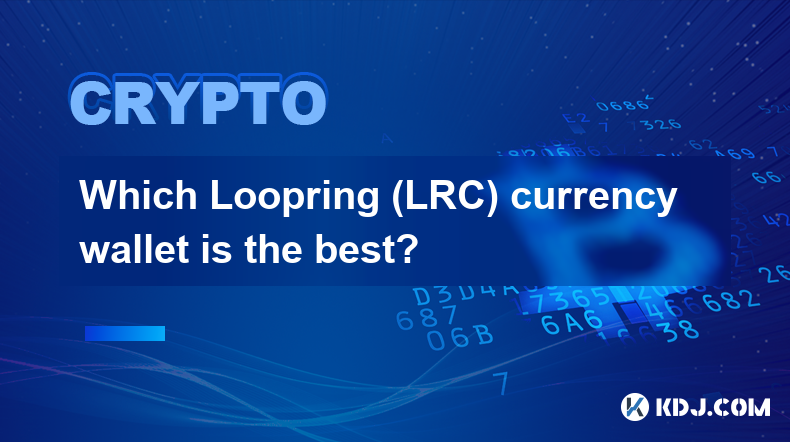-
 Bitcoin
Bitcoin $97,219.4672
1.63% -
 Ethereum
Ethereum $1,820.8950
1.13% -
 Tether USDt
Tether USDt $1.0001
0.02% -
 XRP
XRP $2.1327
-0.43% -
 BNB
BNB $602.3281
0.03% -
 Solana
Solana $147.7911
1.09% -
 USDC
USDC $0.9999
-0.01% -
 Dogecoin
Dogecoin $0.1725
1.12% -
 Cardano
Cardano $0.6706
0.13% -
 TRON
TRON $0.2489
1.41% -
 Sui
Sui $3.3512
1.53% -
 Chainlink
Chainlink $13.8526
1.44% -
 Avalanche
Avalanche $19.6299
-1.30% -
 UNUS SED LEO
UNUS SED LEO $8.7562
0.40% -
 Stellar
Stellar $0.2611
-0.23% -
 Shiba Inu
Shiba Inu $0.0...01279
1.26% -
 Toncoin
Toncoin $3.0266
0.40% -
 Hedera
Hedera $0.1765
0.37% -
 Bitcoin Cash
Bitcoin Cash $369.4993
2.08% -
 Hyperliquid
Hyperliquid $21.1995
1.68% -
 Litecoin
Litecoin $89.5955
4.54% -
 Polkadot
Polkadot $3.9568
0.63% -
 Dai
Dai $1.0002
0.01% -
 Monero
Monero $282.5473
-1.06% -
 Bitget Token
Bitget Token $4.2199
-1.10% -
 Ethena USDe
Ethena USDe $1.0007
0.03% -
 Pi
Pi $0.5835
0.91% -
 Pepe
Pepe $0.0...08266
4.18% -
 Bittensor
Bittensor $367.8815
0.84% -
 Uniswap
Uniswap $4.8814
-0.32%
Which Loopring (LRC) currency wallet is the best?
The Loopring Smart Wallet stands out as the optimal choice for enhanced security and native Layer 2 integration, providing users with a safe and seamless experience.
Dec 08, 2024 at 12:13 pm

Which Loopring (LRC) Currency Wallet is the Best?
Introduction
Loopring (LRC) is a decentralized cryptocurrency exchange platform that allows users to trade cryptocurrencies without the need for a middleman. This makes it a more private and secure option than traditional centralized exchanges. To use Loopring, you need a currency wallet that supports LRC.
There are numerous currency wallets available, making choosing the best one for your needs a daunting task. To help you make an informed decision, we've compiled a comprehensive guide to the best Loopring currency wallets.
Top Loopring (LRC) Currency Wallets
- Loopring Smart Wallet
Features:
- Developed and maintained by the Loopring team.
- Highly secure and non-custodial, meaning you have complete control over your private keys.
- Offers native support for LRC and other Ethereum-based tokens.
- Enables participation in Loopring's Layer 2 protocol, providing faster and cheaper trading.
- Integrates with hardware wallets like Ledger and Trezor for enhanced security.
- MetaMask
Features:
- Widely recognized browser extension wallet.
- Supports LRC and a vast range of other cryptocurrencies.
- Provides easy access to decentralized applications (dApps) and DeFi protocols.
- Integrates with hardware wallets like Trezor and Ledger.
- Offers multiple security features like two-factor authentication (2FA) and phishing protection.
- Exodus
Features:
- User-friendly desktop and mobile wallet.
- Supports LRC and over 200 other cryptocurrencies.
- Provides clear and intuitive charts for tracking your portfolio.
- Integrated exchange feature for seamless asset swapping.
- Enhanced security measures like encryption and seed phrase protection.
- Argent
Features:
- Innovative Argent Card that allows you to spend crypto like fiat currency.
- Specializes in Ethereum-based tokens, including LRC.
- Features an intuitive mobile interface with advanced security protocols.
- Utilizes multi-party computation (MPC) technology for added protection.
- Supports social recovery options in case of lost access to your wallet.
- Ledger Nano X
Features:
- Leading hardware wallet that provides unparalleled security.
- Supports LRC and a wide variety of other cryptocurrencies.
- Features an integrated touchscreen and Bluetooth connectivity for ease of use.
- Supports multiple crypto applications and allows for seamless integration with Loopring's Layer 2 protocol.
- Certified by independent security experts for its trustworthiness.
Factors to Consider When Choosing a Loopring Currency Wallet
- Security: Prioritize wallets that implement robust security measures like encryption, 2FA, and hardware wallet compatibility.
- User Friendliness: Choose a wallet with an intuitive interface and comprehensive features that meet your trading needs.
- Supported Assets: Ensure that the wallet supports LRC and any other cryptocurrencies you may wish to hold or trade.
- Fees: Consider the transaction fees associated with the wallet and choose one that fits your trading frequency and budget.
- Community Support: Look for wallets with an active community and well-established support channels for assistance when needed.
Additional Tips
- Research and read reviews of different Loopring wallets before making a decision.
- Set up multiple levels of security, such as strong passwords and multi-factor authentication.
- Make regular backups of your wallet's private key or seed phrase.
- Avoid storing large amounts of LRC in custodial wallets.
- Only use trusted and reputable exchanges to purchase or withdraw LRC.
Disclaimer:info@kdj.com
The information provided is not trading advice. kdj.com does not assume any responsibility for any investments made based on the information provided in this article. Cryptocurrencies are highly volatile and it is highly recommended that you invest with caution after thorough research!
If you believe that the content used on this website infringes your copyright, please contact us immediately (info@kdj.com) and we will delete it promptly.
- Jupiter Expands Its Onboarding Features With Universal Send
- 2025-05-08 05:45:12
- Ethereum Activates Pectra Network Upgrade, Introducing Smart Accounts and Higher Staking Limits
- 2025-05-08 05:45:12
- On May 7, 2025, the cryptocurrency market is buzzing with significant developments
- 2025-05-08 05:40:13
- The Federal Reserve Maintained Its Lending Rate Between 4.25 and 4.5 Percent on Wednesday
- 2025-05-08 05:40:13
- As Institutional Players Slow Their Bitcoin Buying, Retail Traders Are Turning to a New Way to Ride the Next Wave – and BTC Bull Token Is Ready for Liftoff
- 2025-05-08 05:35:13
- Tether Expands Reach by Launching USDT Stablecoin on Kaia Blockchain
- 2025-05-08 05:35:13
Related knowledge

Is Ethereum Layer2 fee low? How to use it cheaper?
May 08,2025 at 03:56am
The question of whether Ethereum Layer 2 solutions offer lower fees and how to use them more economically is a topic of great interest within the cryptocurrency community. Ethereum's Layer 2 solutions have been developed to address the high transaction fees and scalability issues associated with the main Ethereum network. In this article, we will delve ...

How to calculate Ethereum network fee? How to reduce transaction costs?
May 08,2025 at 02:15am
Understanding and managing Ethereum network fees is crucial for anyone involved in transactions on the Ethereum blockchain. The network fee, also known as gas fee, is the amount of Ether (ETH) required to successfully conduct a transaction or execute a smart contract on the Ethereum network. Calculating these fees and finding ways to reduce them can sig...

What is Ethereum Gas Fee? How to optimize Gas Fee to save costs?
May 08,2025 at 03:43am
Ethereum gas fees are a crucial aspect of interacting with the Ethereum blockchain. Understanding and optimizing these fees can significantly impact the cost-effectiveness of transactions and smart contract interactions. In this article, we will delve into what Ethereum gas fees are, how they are calculated, and provide detailed strategies for optimizin...

How to perform MOVE cross-chain transfer? What to do if the gas fee is too high?
May 07,2025 at 08:03pm
Introduction to MOVE Cross-Chain TransferCross-chain transfers have become an essential part of the cryptocurrency ecosystem, allowing users to move assets between different blockchain networks. One of the popular protocols for achieving this is the MOVE cross-chain transfer. This article will guide you through the process of performing a MOVE cross-cha...

Does DYDX support cross-chain? Is the transfer speed fast?
May 07,2025 at 05:56pm
Introduction to DYDXDYDX is a leading decentralized exchange (DEX) that primarily operates on the Ethereum blockchain. It is known for its advanced trading features, including perpetual contracts and margin trading. A common question among users is whether DYDX supports cross-chain functionality and how fast the transfer speeds are. In this article, we ...

How to close a DYDX contract? How to set an automatic stop loss?
May 08,2025 at 12:29am
Closing a DYDX contract and setting an automatic stop loss are crucial skills for managing your positions on the dYdX decentralized exchange. Whether you're looking to mitigate risk or simply exit a trade, understanding these processes can enhance your trading strategy. In this article, we will explore the detailed steps for closing a DYDX contract and ...

Is Ethereum Layer2 fee low? How to use it cheaper?
May 08,2025 at 03:56am
The question of whether Ethereum Layer 2 solutions offer lower fees and how to use them more economically is a topic of great interest within the cryptocurrency community. Ethereum's Layer 2 solutions have been developed to address the high transaction fees and scalability issues associated with the main Ethereum network. In this article, we will delve ...

How to calculate Ethereum network fee? How to reduce transaction costs?
May 08,2025 at 02:15am
Understanding and managing Ethereum network fees is crucial for anyone involved in transactions on the Ethereum blockchain. The network fee, also known as gas fee, is the amount of Ether (ETH) required to successfully conduct a transaction or execute a smart contract on the Ethereum network. Calculating these fees and finding ways to reduce them can sig...

What is Ethereum Gas Fee? How to optimize Gas Fee to save costs?
May 08,2025 at 03:43am
Ethereum gas fees are a crucial aspect of interacting with the Ethereum blockchain. Understanding and optimizing these fees can significantly impact the cost-effectiveness of transactions and smart contract interactions. In this article, we will delve into what Ethereum gas fees are, how they are calculated, and provide detailed strategies for optimizin...

How to perform MOVE cross-chain transfer? What to do if the gas fee is too high?
May 07,2025 at 08:03pm
Introduction to MOVE Cross-Chain TransferCross-chain transfers have become an essential part of the cryptocurrency ecosystem, allowing users to move assets between different blockchain networks. One of the popular protocols for achieving this is the MOVE cross-chain transfer. This article will guide you through the process of performing a MOVE cross-cha...

Does DYDX support cross-chain? Is the transfer speed fast?
May 07,2025 at 05:56pm
Introduction to DYDXDYDX is a leading decentralized exchange (DEX) that primarily operates on the Ethereum blockchain. It is known for its advanced trading features, including perpetual contracts and margin trading. A common question among users is whether DYDX supports cross-chain functionality and how fast the transfer speeds are. In this article, we ...

How to close a DYDX contract? How to set an automatic stop loss?
May 08,2025 at 12:29am
Closing a DYDX contract and setting an automatic stop loss are crucial skills for managing your positions on the dYdX decentralized exchange. Whether you're looking to mitigate risk or simply exit a trade, understanding these processes can enhance your trading strategy. In this article, we will explore the detailed steps for closing a DYDX contract and ...
See all articles





















































































